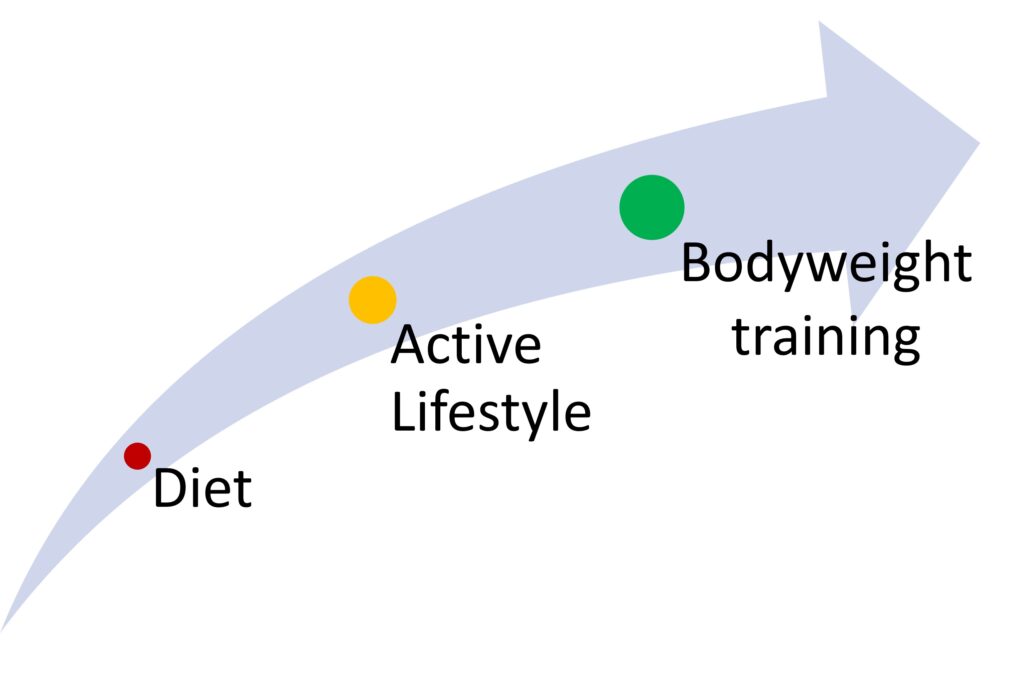Tired of Feeling Bloated and Unhappy with Your Weight?
Are you tired of feeling bloated, sluggish, and unhappy with your weight? Do you feel like you’ve tried every diet and exercise program out there with little to no results? If so, you’re not alone. Millions of people struggle with weight loss, and it can be a frustrating and discouraging experience.
In this article, I’m going to share with you how I achieved a remarkable weight loss of 12 kilograms (≈ 26.45 pounds) in just 3 months without much effort. I did it by following three simple rules that anyone can follow.

A Story of Overcoming
A few years ago, my life took an unexpected turn. I became a father, and simultaneously, my schedule became increasingly demanding due to obligatory daily tasks that I couldn’t avoid. The increase in responsibilities and the new lifestyle led me to neglect my health. I started eating more carelessly and reducing my physical activity.
As a result, I began to gain weight. Initially, I didn’t pay much attention to it. I thought it was temporary and that once I adapted to my new routine, I would return to my healthy habits. However, the weight continued to increase.
I decided to return to my regular diet, but I didn’t achieve the expected results. My weight remained constant, leading me to reflect that perhaps I was in a situation of balance between the calories I consumed and those I burned. It was then that I realized that with a conscious focus on my nutrition and a minimal daily exercise routine at home, I could trigger a significant change in my body.
Finally, embracing the calorie deficit, taking daily walks into my daily routine, and incorporating 30 minutes of exercise to enhance weight loss, I achieved a notable change in my physique and overall health. In just three months, I lost 12 kilograms and experienced a complete transformation. Through this journey, I learned three simple yet powerful rules that were key to my success.
The 3 Simple Rules: A Blueprint for Effective Weight Loss
To achieve effective weight loss, maintaining a calorie deficit is crucial. By combining proper dieting with an active lifestyle an environment conducive to achieving and sustaining a calorie deficit is created, thus driving optimal weight loss. Furthermore, if we incorporate short-duration exercise routines, we will maximize the results. Overcoming procastination is crucial if you want to achieve your fitness goals.

The first rule revolves around eating only what your body needs at rest, a crucial aspect of weight loss. To achieve this effectively, consider these aspects:
- Calculate your basal metabolic rate (BMR): Your BMR represents the number of calories your body needs to function optimally. By eating in accordance with this baseline, you ensure you’re not over-consuming calories. The calorie deficit should not exceed 500 calories and only for a limited time. Check my last article about BMR.
- Focus on nutritious, whole foods while avoiding processed items, sugary beverages, and unhealthy fats.
- Employing portion control and tracking your food intake can aid in this process.
The second rule emphasizes the importance of having an active lifestyle. This doesn’t need to be intense; even a brisk walk for half an hour can yield significant benefits. While walking is an excellent option for physical activity, if you’re unable to go for walks, aim to stay active in other ways. For example, engage in activities like walking to the grocery store, taking the stairs instead of the elevator, or parking further away from your destination to stay active throughout the day. These movements contribute to calorie burning and overall well-being, even if you can’t step outside for a walk.
Lastly, the third rule highlights the value of incorporating bodyweight circuit training to maximize weight loss results. However, it’s important not to perform the circuit every day. Instead, alternate between doing the circuit one day, engaging in moderate physical activity the next (such as going for a walk), and then taking a rest day (which involves staying active but not following any exercise routine). This alternating approach helps prevent overtraining and supports long-term progress in weight loss and overall fitness.
By adhering to these three rules—managing calorie intake, staying active, and integrating exercise into your routine —you can establish a sustainable path towards achieving a calorie deficit and realizing your weight loss goals.
Addressing Common Challenges and Misconceptions
One of the biggest challenges people face when trying to lose weight is sticking to their diet and exercise plan. It can be difficult to resist temptation, especially when you’re surrounded by unhealthy food and sedentary activities.
Here are a few tips for overcoming these challenges:
- Set realistic goals: Trying to lose too much weight too quickly is a recipe for failure. Aim to lose 0.5-1 kilos (around 1-2 pounds) per week, which is a safe and sustainable rate.
- Manage your time effectively: Apply personal time management strategies to schedule workouts and meal prep to ensure consistency and reinforce progress.
- Make gradual changes. Don’t try to overhaul your entire lifestyle overnight. Start by making small changes that you can stick with, such as cutting out sugary drinks or adding a 30-minute walk to your daily routine.
- Find an accountability partner. Having someone to support you and check in with can help you stay on track.
- Don’t give up. There will be setbacks along the way. Just pick yourself up and keep going.
- Another common misconception is that you need to eat bland, tasteless food to lose weight. This is simply not true. There are plenty of delicious and healthy foods that you can enjoy while still losing weight.
Here are a few tips for eating healthy:
- Focus on whole, unprocessed foods. These foods are packed with nutrients and fiber, which will help you feel full and satisfied.
- Limit your intake of processed foods, sugary drinks, and unhealthy fats. These foods are high in calories and low in nutrients, which can sabotage your weight loss efforts.
- Cook more meals at home. This gives you more control over the ingredients and portion sizes.
- Don’t skip meals. Skipping meals can lead to overeating later in the day.
- Eat slowly and mindfully. Pay attention to your hunger and fullness cues.
Achieving Long-Term Success: Sustaining Your Weight Loss Achievements
Once you’ve reached your weight loss goals, it becomes essential to maintain your progress, a task often more demanding than shedding the pounds initially.
Here are some strategies for preserving your weight loss:
- Maintain a balanced diet and regular exercise regimen to deter weight regain.
- Allow occasional indulgences while ensuring they remain sporadic, not habitual.
- It’s important to exercise self-control to avoid falling back into unhealthy eating habits.
- Adopt healthy coping mechanisms for managing stress, as stress can trigger unhealthy eating patterns. Consider practices like yoga, meditation, or spending time outdoors.
- Refrain from comparing your journey to others’, recognizing that everyone’s path is unique. Focus on your personal advancements and commemorate your victories along the way.
From Shedding Belly Fat to Embracing a Healthier Lifestyle: Adopting a Holistic Approach
Embarking on a weight loss journey transcends merely altering the digits on the scale; it entails enhancing your overall health and wellness. By adhering to the three fundamental principles delineated in this piece and embracing a holistic approach to your well-being, sustainable weight loss and a healthier lifestyle become attainable goals.
Consider these supplementary pointers for fostering holistic health and well-being:
- Prioritize ample sleep. Quality rest promotes sound decision-making and enhances overall health.
- Effectively manage stress levels. Chronic stress poses risks of weight gain and other health complications.
- Schedule regular check-ups with your healthcare provider. Routine visits ensure alignment with your weight loss objectives and facilitate addressing any underlying health issues.
- Keep in mind that the journey toward weight loss and enhanced health is ongoing; it’s a process rather than a fixed destination. Anticipate fluctuations along the way. However, by maintaining dedication to your goals and consistently making health-conscious choices, you’ll ultimately reach your desired outcomes.
Take Charge of Your Health and Experience Sustainable Weight Loss
I hope this article has inspired you to take charge of your health and achieve your weight loss goals. Remember, it’s not about being perfect; it’s about making progress every day. With dedication and perseverance, you can achieve sustainable weight loss and a healthier lifestyle.
Must-Reads for Healthy Weight Loss and Well-being
- “How Not to Diet: The Groundbreaking Science of Healthy, Permanent Weight Loss” by Dr. Michael Greger. Explores the science behind plant-based eating for sustainable weight loss and optimal health.
- “The Obesity Code – Unlocking the Secrets of Weight Loss” by Dr. Jason Fung. Delves into the hormonal factors influencing weight gain and offers strategies for reversing the trend.
Call to Action
Remember to share this article with your friends and family who may be struggling with their weight loss journey. Together, we can help each other achieve our goals.



